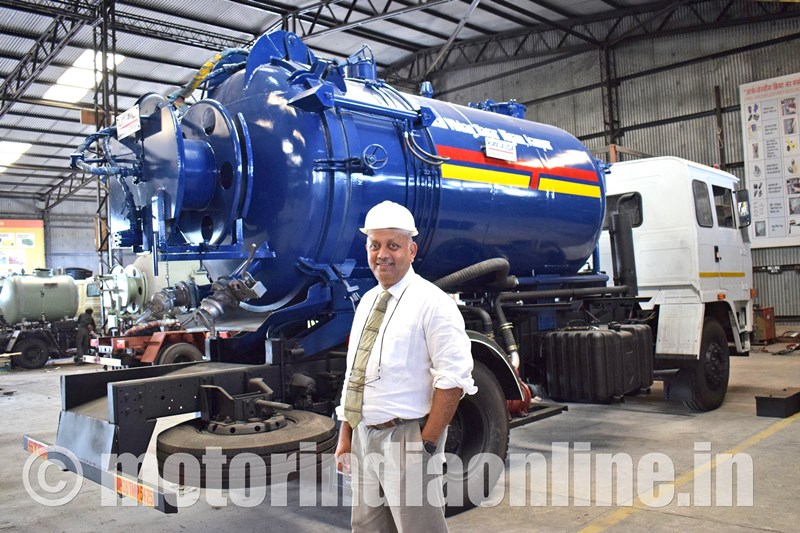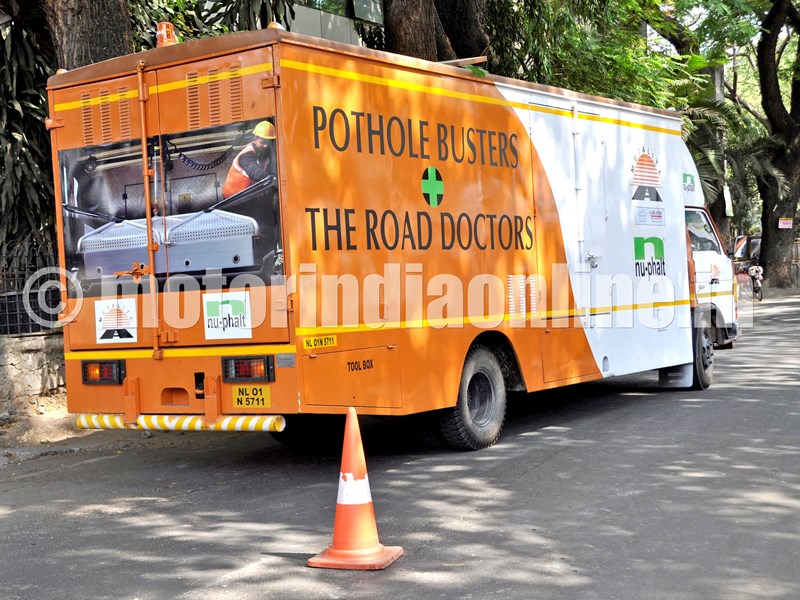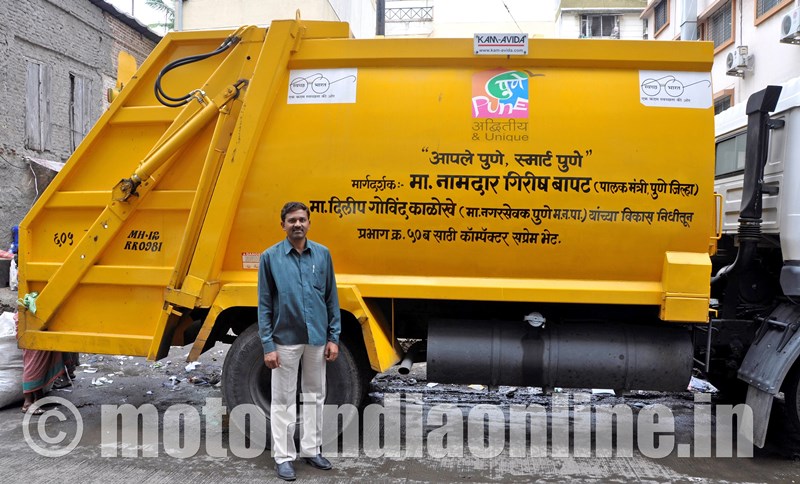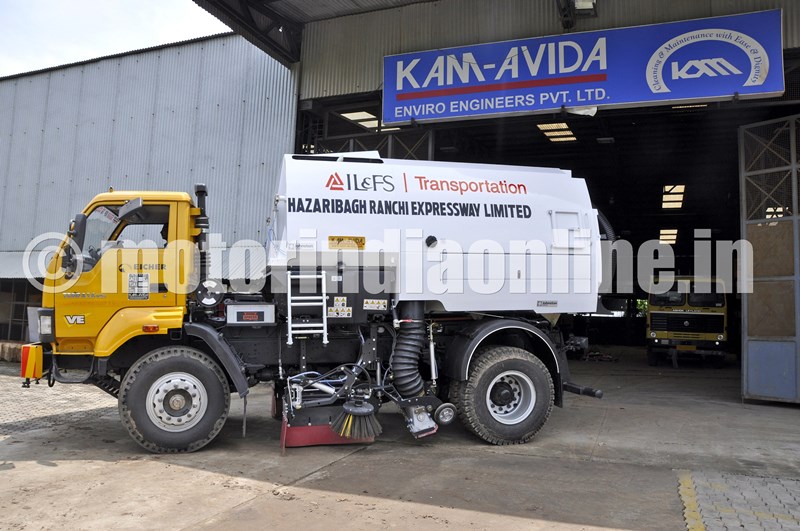Tie-up with Trans Metalite India on the cards
Kam-Avida Enviro Engineers Pvt. Ltd., a prominent manufacturer of waste handling equipment such as suction-cum-jetting drain cleaning machines, solid waste collection and transportation equipment, as well as vacuum and mechanical street sweepers, is ready to supply India’s first road patching machine.

Kam-Avida is all set to collaborate with Trans Metalite India Ltd. (TMIL) which has a joint venture with the UK-based Nu-Phalt. “We are going to be responsible for the mounting on Indian chassis, distribution and servicing while the road patching equipment will be imported from Nu-Phalt directly. The Nu-Phalt technology doesn’t use an open fire, instead uses an infrared heating coil technology to heat the potholes without the need for noisy drills or surface altering fumes. The Kam-Patch can repair pot-holes at about 70% of the traditional cost with zero bitumen wastage – this is better on the pocket and the environment. The process includes – heating a 2 sq.m. area, scarification, additional aggregate of bitumen and emulsion and then reheating the new material to get a proper thermal bonding. The patch is then compacted and can be opened to traffic within 15 minutes”, revealed Mr. M. Krishna, Managing Director, Kam-Avida Enviro Engineers.
Bringing dignity to cleaning
Kam-Avida has been contributing to the cleaning space in India since 1994, bidding and manufacturing as per the requirement of the civic bodies in the country. The company’s solutions include high-pressure water-jet technology, suction-cum-jetting machines, garbage compacting, refuse transfer stations, road sweeping, industrial vacuum cleaners for industrial spillage collection, mobile all terrain excavators, tree transplanters, etc.
“We are a dedicated group of like-minded professionals committed to the task of bringing about mechanisation in the areas of cleaning and maintenance in a country where this task has been traditionally carried out manually; using improvised tools and tackles,” said Mr. Krishna.
Gone are the days when an abundant supply of unskilled labour was available to carry out cleaning and maintenance programs manually. Education, legislation and awareness of health hazards have in fact created a shortage of relevant manpower, thereby compelling the maintenance authorities to mechanise their cleaning & maintenance programs. However, since these machines are to be used by the civic bodies, companies seeking to get business in this space must quote in tenders. The whole space throws up a lot of uncertainty as well as challenges for the manufacturers.
“We don’t make to stock and sell like any other OEMs. Also, no two tenders are similar, as nobody wants to buy machine that is unique to one manufacturer. In fact, this is an integral part of tendering. Every municipal corporation wants to be generic but not brand specific. So, they try to pick up something from everyone’s machine and create a fourth kind of machine which is unique to their organization,” explained the MD.
The company’s manufacturing facility has the wear-with-all to take up these challenges. Situated in Hinjewadi Pune, the capacity is spread over 80,000 sq.ft. “We are over 100 people strong, specializing in back end services such as engineering, design, research & development, production planning & control, purchase, quality assurance, stores, production, commercial, finance & after-sales service,” said the MD.
Quality is the differentiator
Although municipal corporations have notifications about the dimensions in the machines they seek, they are also pressed for price, since they run on public money. Hence, there is always pressure on the part of the manufacturer to adhere to the specifications mentioned and still quote within the budget. “We have higher standards and select critical components like the power-take off, the vacuum pump and the jetting pump from world-renowned players and design as per the tender. The difference we add are in the moving parts, tipping angles, hydraulic drives, mechanical drives, etc. Selection of these parts adds upto the longevity of the machine. These proven brands and components do not fail. Hence the civic body’s confidence goes up and they buy more if they see positive results. For instance, Bangalore bought 5 machines 20 years ago. Now they have 150 machines from us,” beams Mr. Krishna.
On the back of quality solutions, Kam-Avida, on an average, is able to produce 400 machines a year. It is hard to gauge the total industry volume given the fragmented nature of the industry. A rough estimate would still be 1,200-1,500 machines per year given there are around 400 tenders per year with an average of 2-3 machines per tender.
“Civic bodies have enough funds in their kitty, thanks to the Swacchh Bharat Mission, and hence we see good orders coming our way. Andhra Pradesh, under the ‘Swachha Andhra Corporation’, has ordered about 140 garbage compactors and we have been fortunate to work with PPS Auto, Hyderabad, an Ashok Leyland dealer to mount our product on their trucks. These will be distributed by the state to their large city corporations. A lot of other States like Tamil Nadu and Karnataka are following the Andhra Pradesh model,” informed Mr. Krishna.
Expecting sustainable growth
While every business faces cyclicity of orders, the inherent nature of government tenders and their cycle of payments is what makes sustainable ‘rolling’ growth a little difficult. “While we achieved a peak of 100 crores four years ago, we had the same amount as outstanding for months. Since, it is local authorities involved, collection becomes chronic,” averred Mr. Krishna. One must be stationed there for a considerable period to be able to receive your dues in time.
Even the most efficient and conventional method of collecting payment against a bill will take a minimum of three months. He added: “Our working capital thus gets stuck, and the cash flow is a problem. It also breaks our backbone to honour orders elsewhere. Timely collection of our payments is the biggest challenge of our industry, and if addressed by all the municipal bodies or governed under a central government authority could open up lot of unexplored opportunity.”
A probable working solution to sustainable growth is to supply through a contractor or service provider. In the last couple of years, Kam-Avida has consciously tried to have a customer mix of 75% contractors and balance civic bodies. “It works out safer for us to supply to a private player. It assures us the capital required for growth, and it is then the contractor’s role to get his money from the municipality. It works fine with civic bodies too as they have turned their cap-ex into op-ex, since they are not buying the machines but are paying for the service. The money spent in this manner is a revenue budget for them,” stated Mr. Krishna.
It is clearly a win-win situation for both the company and the contractors. The contractors are locals, so they can follow up regularly to get their bills cleared. The strategy of Kam-Avida by 2020 is to grow 15 per cent every year on the operating productivity. “Our aim is to make premium high-quality machine. Instead of three different tenders yielding us Rs. 1-2 crores, one good high quality machine giving the same money will be better. By 2020, cumulatively from this year, we should aim at a turnover of Rs. 200 crores. Although moderate, we are looking at a more sustained organic growth,” concluded Mr. Krishna.


